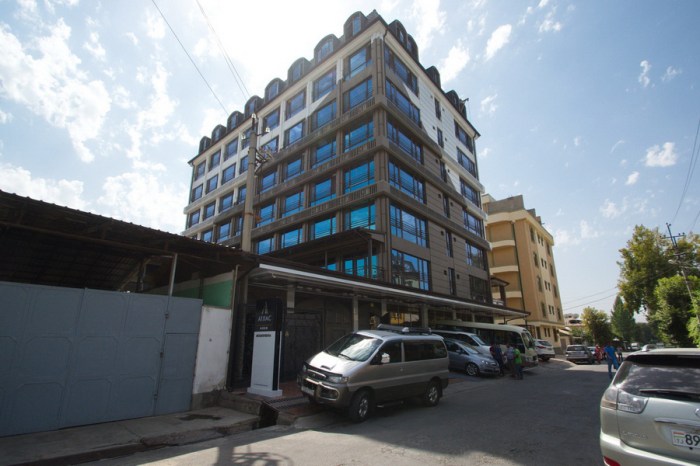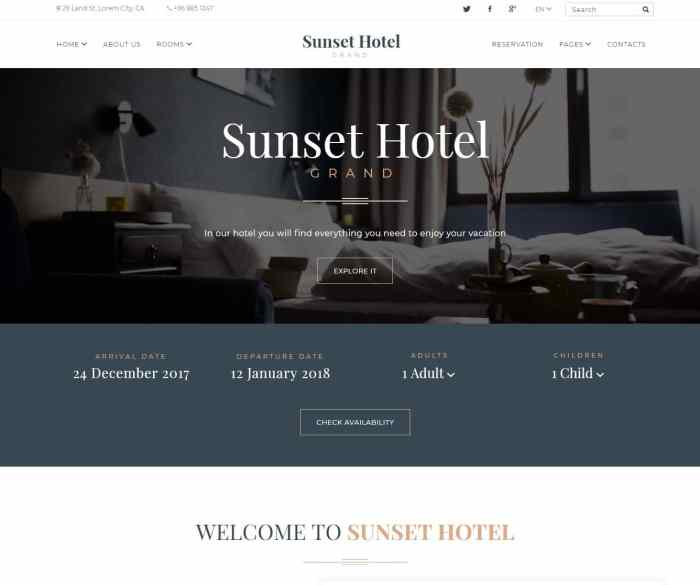Discount Hotel Sites Your Travel Savings Hub
Discount hotel sites are your one-stop shop for securing incredible deals on accommodations. These platforms aggregate listings from various hotels, offering a vast selection of options for travelers seeking value. They work through various mechanisms, like metasearch and aggregator models, or even hotel-specific deals, to provide you with the best prices. Whether you’re a budget-conscious backpacker or a luxury traveler, a discount hotel site can potentially save you money and time.
This guide delves into the world of discount hotel sites, exploring their different types, the benefits they offer, and the factors influencing their prices. We’ll examine user experience, emerging trends, and crucial strategies for both users and site operators, ultimately empowering you to make informed decisions when booking your next trip.
Introduction to Discount Hotel Sites

Source: millionmilesecrets.com
Discount hotel sites are online platforms that connect travelers with hotels offering discounted rates. They act as intermediaries, aggregating listings and deals from various hotels, streamlining the search process for travelers seeking affordable accommodations. These sites play a crucial role in the modern travel industry, offering valuable options for budget-conscious travelers.
Different types of discount hotel sites cater to diverse needs and preferences, leveraging various strategies to provide competitive prices. These include metasearch engines, aggregators, and hotel-specific deal sites, each with distinct functionalities and profit models.
Types of Discount Hotel Sites
Discount hotel sites vary in their approach to connecting travelers with discounted accommodations. Understanding these differences is crucial for maximizing savings and choosing the most suitable platform for individual travel plans.
Metasearch Engines
Metasearch engines are online tools that search across multiple travel booking platforms simultaneously. They do not directly book accommodations but instead present aggregated results from various providers. This process often involves comparing prices and amenities across different websites. The comparison facilitates informed decisions by presenting a comprehensive overview of available options.
Aggregators
Aggregators compile listings from various hotels and other providers onto a single platform. They typically have agreements with multiple hotels, allowing them to offer discounted rates and exclusive deals to registered users. This streamlined approach makes it easier for travelers to find and compare hotel options. Travelers often find competitive pricing and comprehensive hotel information through these sites.
Hotel-Specific Deals
Hotel-specific deal sites are platforms focused on showcasing deals from individual hotels. These sites may offer exclusive promotions or discounts, often reserved for specific booking periods or target audiences. This approach often leads to unique savings and customized travel experiences. These sites provide direct links to the hotels’ websites for booking.
Comparison of Discount Hotel Sites
| Feature | Metasearch | Aggregator | Hotel-Specific Deals |
|---|---|---|---|
| Mechanism | Searches across multiple booking sites and displays results. | Aggregates listings from various hotels and providers onto one platform. | Focuses on individual hotel deals, often with exclusive offers. |
| Target Audience | A broad range of travelers seeking the best price across all options. | Budget-conscious travelers who value convenience and a wide selection of hotels. | Travelers looking for specific hotel deals often with particular dates or preferences. |
| Profit Model | Commission-based, earning a fee from the booking platform when a booking is made through their link. | Commission-based, with varying rates based on the hotel and booking. | Commission-based, with rates varying based on the hotel and deal. |
Benefits of Using Discount Hotel Sites
Discount hotel sites offer travelers a wealth of advantages, streamlining the hotel booking process and maximizing value. They provide a centralized platform to compare prices and availability, significantly enhancing the traveler’s ability to secure the best possible deals.
These sites function as powerful tools, providing users with access to a wider selection of hotels than they might find browsing individual hotel websites. This wider selection allows for more choices and greater potential for finding accommodations that perfectly suit the traveler’s needs and preferences.
Price Comparison and Savings
The ability to compare prices across multiple hotels is a significant benefit. Discount hotel sites aggregate data from various hotels, presenting travelers with a comprehensive overview of available rates. This direct comparison often reveals considerable savings compared to booking directly through a hotel’s website. For instance, a traveler might find a room at a popular city hotel for 20% less through a discount site than by booking directly. This translates to significant cost savings for the traveler, allowing them to allocate those funds towards other aspects of their trip, such as dining or activities.
Wider Selection of Hotels
Discount hotel sites often have access to a broader inventory of hotel rooms than individual hotels themselves. This wider selection encompasses various hotel types, from budget-friendly options to luxury accommodations. This extensive selection allows travelers to find hotels that align with their specific preferences and budgets, leading to a more satisfying travel experience. This feature contrasts with the limited inventory frequently presented on individual hotel websites.
Special Deals and Promotions
These platforms frequently feature exclusive deals and promotions that are not available on the hotel’s own site. These special deals could include discounts, packages, or early-bird booking offers, enhancing the value proposition for travelers. This can include last-minute deals, weekend packages, or promotional offers designed to attract guests during specific periods.
User Reviews and Ratings
User reviews and ratings play a crucial role in informing travelers’ decisions. These reviews offer insights into the quality of the hotel, service, and amenities, allowing travelers to make more informed choices. The ability to read reviews from previous guests provides an invaluable perspective, allowing travelers to understand the nuances of the hotel environment and anticipate their experience. Sites often present reviews in a structured format, allowing for easy navigation and assessment. These reviews, along with ratings, provide a crucial element for determining the suitability of a hotel, adding transparency to the booking process.
Factors Affecting Discount Hotel Site Prices: Discount Hotel Sites
Discount hotel websites offer a wide range of options for travelers seeking budget-friendly accommodations. Understanding the factors influencing these prices is crucial for maximizing savings and securing the best deals. These factors often intertwine, creating a dynamic pricing landscape that can be both challenging and rewarding to navigate.
Seasonality and Demand
The demand for hotel rooms fluctuates significantly throughout the year, influenced by factors like holidays, special events, and weather patterns. High demand often results in higher prices, particularly during peak seasons. Conversely, prices tend to be lower during off-seasons or periods of reduced demand. For instance, hotel rooms in popular tourist destinations are typically more expensive during summer months due to increased tourist traffic. Understanding these seasonal trends is essential for securing competitive rates.
Booking Dates and Times
Booking dates and times can significantly affect displayed prices. Hotels often adjust their pricing strategies based on anticipated demand at various points in the future. Early bookings, especially for popular events, often lead to lower rates, reflecting the hotel’s confidence in filling the rooms. Conversely, booking closer to the travel date might lead to higher prices due to dwindling availability and increased demand. This dynamic interplay of demand and booking timing should be considered by travelers when planning their trips.
Competitor Pricing
Hotel pricing is often influenced by competitor pricing strategies. Hotels monitor the rates offered by competing establishments on the same platform and adapt their own pricing accordingly. This competitive environment necessitates careful analysis by discount hotel sites to ensure competitive rates while maintaining profitability. For example, if a competitor significantly reduces their rates, the hotel might adjust its prices to remain competitive and attract bookings.
Special Promotions and Offers
Special promotions and offers, often seasonal or event-based, are common strategies employed by hotels to attract customers and stimulate demand. These promotions frequently affect the displayed prices on discount hotel sites. Loyalty programs, package deals, and other incentives can offer significant savings, potentially leading to substantial discounts on listed rates. Examples of such promotions include weekend deals, early bird discounts, or group discounts.
External Factors
External factors, including local events and happenings, also play a crucial role in influencing hotel pricing. Major events in a city or region, such as festivals, conferences, or sporting events, often increase demand and consequently, hotel prices. Similarly, local or regional issues, such as natural disasters or political unrest, can also impact the demand and consequently, pricing. Hotels adjust their pricing strategies in response to these external factors, which significantly influence the displayed rates.
Choosing the Right Discount Hotel Site
Selecting the ideal discount hotel site for your next trip hinges on careful consideration. Different platforms cater to diverse needs and preferences, offering varying features and price points. Understanding these nuances is crucial to securing the best possible deal without compromising quality or convenience.
Criteria for Selecting a Discount Hotel Site
A thorough evaluation of various factors is essential to finding the most suitable discount hotel site for a specific trip. This includes considering the destination, travel dates, desired amenities, and budget. Furthermore, the site’s reputation and user reviews play a critical role in making an informed decision.
Importance of User Reviews and Ratings
User reviews and ratings provide invaluable insights into the quality of accommodations and the overall experience offered by a particular hotel. These insights extend beyond price, encompassing factors like cleanliness, service, and location. By analyzing reviews, travelers can gauge the authenticity of the hotel’s reputation and identify potential issues or positive attributes.
Factors to Consider When Comparing Discount Hotel Sites
Several key factors should guide your decision when comparing different discount hotel sites. These include the range of hotels available, the variety of amenities offered, and the site’s ease of use. A site with a wide selection of hotels, especially in the desired location, will enhance the chances of finding a suitable match. Similarly, the site’s features, such as filtering options and search capabilities, should contribute to a streamlined and efficient booking process.
- Hotel Selection: Consider the breadth of hotels listed. A wider selection increases the likelihood of finding a hotel that meets your specific needs. For example, a site featuring a broad spectrum of hotels from budget-friendly options to luxury accommodations allows for more choices.
- Filtering Options: Assess the sophistication of filtering options. The ability to filter by star rating, amenities, location, and price range enhances the search process. This targeted approach ensures that only suitable hotels appear, saving time and effort.
- Price Transparency: Evaluate the clarity and accuracy of pricing information. Sites with clear, upfront pricing and no hidden fees offer a more transparent experience. This helps avoid surprises during the booking process and ensures you’re getting the best possible value.
- Ease of Use: Consider the site’s navigation and overall user experience. A well-designed interface with intuitive controls and clear instructions streamlines the booking process. This user-friendly experience ensures a smooth transaction.
- Customer Support: Assess the availability and responsiveness of customer support channels. Prompt and helpful assistance is essential in case of issues or questions during the booking process. Reliable customer service ensures a positive user experience.
Verifying Legitimacy and Reliability of Discount Hotel Sites
Verifying the legitimacy and reliability of discount hotel sites is paramount. Begin by checking for security certifications like HTTPS, indicating secure data transmission. Review the site’s terms and conditions to understand their policies and practices. Look for testimonials from past users and check for industry recognition or awards.
- Security Measures: Verify the presence of security protocols, such as HTTPS, to ensure secure data transmission. This protects sensitive information like payment details during transactions.
- Site Policies: Review the site’s terms and conditions, cancellation policies, and payment methods to understand their operating principles and procedures. Understanding these details mitigates potential issues.
- Customer Reviews: Scrutinize online reviews and ratings to assess the site’s reputation and user experiences. This can reveal insights into the site’s trustworthiness and reliability.
- Industry Recognition: Look for any industry certifications or awards the site might have received. These indicators can vouch for the site’s standing and credibility.
User Experience on Discount Hotel Sites
A positive user experience is paramount for discount hotel sites to thrive. A well-designed site not only facilitates easy booking but also fosters customer trust and encourages repeat business. A seamless and intuitive interface ensures that users can quickly find the perfect hotel within their budget and preferences.
Effective design elements, clear communication, and user-friendly search options contribute significantly to the overall user experience. The navigation and layout of a discount hotel site directly influence how easily users can locate desired information and complete their booking process.
Typical User Interface and Navigation Features
Discount hotel sites typically feature a clear and concise layout. Navigation menus are strategically placed to allow users to easily access different sections of the site, such as hotel listings, search tools, and booking pages. Search bars are prominent, enabling users to quickly input their travel dates and destination. Filter options are often provided to narrow down results based on various criteria. A visually appealing design, using appropriate colors and typography, enhances the overall user experience.
Effective Site Design Elements
Several design elements contribute to a positive user experience. Visual appeal, with high-quality images of hotels, is crucial. This allows users to envision themselves staying at the hotel and helps them make informed decisions. Employing a responsive design ensures the site functions flawlessly across different devices, from desktops to mobile phones and tablets. This adaptability caters to the diverse needs of users. A clear call to action, such as “Book Now,” is strategically placed throughout the site, guiding users towards the booking process.
Clear Communication and Information Architecture
Clear communication and a well-structured information architecture are essential for user understanding. Site content should be presented in a straightforward and easily understandable manner. Avoid jargon or technical terms. Use concise and descriptive language to explain the features and benefits of each hotel. Hotel descriptions should be comprehensive, providing essential details about the amenities, location, and surrounding areas. User-friendly language, avoiding complex sentences, helps users quickly grasp the information.
Filters and Search Options
Filter options allow users to narrow down their search results based on specific criteria. These options typically include price range, star rating, hotel amenities, location, and more. A robust search engine is vital, enabling users to efficiently refine their search by adjusting parameters like check-in/check-out dates, guest count, and specific hotel features. Advanced search filters, like proximity to attractions, can further refine results. This targeted approach empowers users to find the most suitable hotel for their needs. The site should also offer clear and informative explanations for each filter option. A detailed explanation of each filter allows users to make informed choices.
Emerging Trends in Discount Hotel Sites

Source: autoeurope.com
Discount hotel sites are constantly evolving to meet the changing needs and expectations of travelers. These platforms are adapting to technological advancements and market dynamics to provide more personalized experiences and enhanced value propositions. This evolution is crucial for maintaining their competitive edge in the online travel space.
Personalized Recommendations
Discount hotel sites are increasingly leveraging data analysis and machine learning algorithms to provide highly personalized recommendations. These recommendations consider individual travel preferences, past booking history, and current travel trends to suggest hotels that align perfectly with a user’s needs. This personalized approach enhances user engagement and drives conversions. For example, a user who frequently books family-friendly hotels in beach destinations might receive tailored recommendations for similar hotels during their next search. This personalization can significantly improve the user experience by saving time and effort in the search process.
AI-Powered Tools
Artificial intelligence (AI) is transforming the way discount hotel sites operate. AI-powered chatbots can provide instant support, answer queries, and assist with booking procedures. Automated tools can also analyze large datasets to identify trends and predict demand, allowing sites to optimize pricing strategies and inventory management. This approach can streamline the entire user journey, making it more efficient and user-friendly.
Mobile-First Design, Discount hotel sites
With the rise of mobile travel, discount hotel sites are prioritizing mobile-first design. This means creating responsive websites and apps that are optimized for various screen sizes and mobile devices. The focus on a mobile-first approach ensures that users can easily access and navigate the platform regardless of their device. This design philosophy enhances the user experience, especially during moments when travelers need quick access to information or need to make last-minute bookings.
Impact of Online Travel Agents (OTAs)
The presence of online travel agents (OTAs) significantly impacts the discount hotel site landscape. OTAs often act as intermediaries, offering a vast selection of hotels, including those listed on discount platforms. This competitive environment necessitates that discount hotel sites differentiate themselves through unique value propositions. This could include exclusive deals, personalized services, or partnerships with specific hotel chains. Strategies to stand out include creating strong brand identities and building loyalty programs.
Future of Discount Hotel Sites
The future of discount hotel sites is shaped by a confluence of technological advancements. The integration of AI and machine learning is expected to further personalize the user experience, leading to more efficient search processes and improved recommendations. Mobile-first designs are critical to cater to the growing mobile travel trend. The influence of OTAs will continue to be significant, necessitating innovative strategies to differentiate discount hotel sites and build a loyal customer base.
Strategies for Success for Discount Hotel Sites
Discount hotel sites thrive on providing value to both travelers and hotels. Successful strategies go beyond simply listing deals; they encompass attracting and retaining users, fostering trust, and optimizing the entire user journey. These strategies are crucial for maintaining a competitive edge in the online travel market.
Driving Traffic and Engagement
Attracting a substantial user base is fundamental to the success of a discount hotel site. Effective strategies encompass a multi-faceted approach, leveraging various channels to maximize visibility and engagement.
- Search Engine Optimization (): Optimizing website content, meta descriptions, and images for relevant search terms is paramount. This ensures the site ranks highly in search engine results pages (SERPs), driving organic traffic. Utilizing long-tail keywords, focusing on specific travel destinations and preferences, and building high-quality backlinks are crucial elements for sustained visibility.
- Social Media Marketing: Engaging social media campaigns can significantly amplify brand reach and foster customer interaction. Utilizing platforms like Instagram, Facebook, and Twitter to showcase attractive hotel deals, user testimonials, and visually appealing content is key. Running contests, offering exclusive deals to followers, and actively participating in relevant online conversations can attract new customers and maintain existing engagement.
- Paid Advertising: Strategic use of paid advertising platforms like Google Ads and social media ads can accelerate website traffic. Targeting specific demographics and interests through well-defined campaigns can lead to high conversion rates. Tracking campaign performance and adjusting strategies based on data analysis is essential for maximizing ROI.
Examples of Successful Marketing Campaigns
Many successful discount hotel sites have implemented campaigns that resonate with travelers. These campaigns often involve strategic partnerships and collaborations.
- Seasonal Promotions: Many hotel sites offer discounts aligned with specific travel seasons. For example, a site might focus on winter sports destinations during the holiday season or offer discounts for summer beach vacations. This targeted approach attracts users actively seeking specific deals during these periods.
- Partnerships with Travel Agencies: Collaborations with travel agencies can broaden the site’s reach and expose it to a wider customer base. Such partnerships often involve special packages or bundled deals, creating more attractive options for travelers.
- Influencer Marketing: Partnering with travel influencers can significantly increase brand visibility. Influencers can promote the site’s deals and experiences to their followers, reaching a targeted audience interested in travel and deals.
Building Brand Loyalty and Customer Relationships
Developing a loyal customer base is crucial for long-term success. This requires building trust and creating a positive customer experience.
- Customer Loyalty Programs: Implementing loyalty programs that reward repeat customers with exclusive deals, discounts, or early access to promotions can foster long-term engagement. A tiered system can incentivize increasing levels of customer loyalty.
- Personalized Recommendations: Using user data to personalize recommendations can improve user experience. Tailoring suggestions to individual travel preferences and past bookings can increase satisfaction and encourage repeat visits.
- User Feedback and Reviews: Actively soliciting and responding to user feedback and reviews is crucial for maintaining a positive brand image and identifying areas for improvement. Address concerns promptly and constructively, demonstrating commitment to customer satisfaction.
Importance of Customer Service and Support
Reliable customer service is critical for maintaining customer trust and resolving issues.
- Accessibility of Support Channels: Providing multiple channels for customer support, such as email, phone, and live chat, ensures accessibility for users. A responsive and helpful support team is vital for addressing queries and resolving complaints quickly and efficiently.
- Proactive Customer Communication: Communicating proactively with customers regarding bookings, changes, or issues is crucial for building trust. Clear and concise communication can prevent misunderstandings and manage expectations effectively.
- Fast and Efficient Resolution: Addressing customer issues swiftly and effectively is essential for maintaining positive relationships. Offering clear solutions and options for resolving problems demonstrates a commitment to customer satisfaction.
Comparison Table of Popular Discount Hotel Sites
A crucial aspect of navigating the online travel landscape is understanding the nuances of different discount hotel platforms. Comparing key features allows travelers to make informed decisions about which site best suits their needs. Different platforms offer varying levels of accuracy, user experience, and customer support, impacting the overall booking experience.
Understanding the strengths and weaknesses of each platform is vital for finding the best deals and a smooth booking process. This comparison table highlights the critical factors to consider when choosing a discount hotel site.
Price Accuracy
Different platforms employ various methods to source and display hotel prices. Price accuracy is a crucial factor, as it directly affects the potential for getting the best possible deal.
| Feature | Booking.com | Expedia | Kayak |
|---|---|---|---|
| Price Accuracy | Generally considered to be quite accurate, often reflecting real-time pricing and including applicable taxes and fees. | Also known for its generally accurate pricing, but occasional discrepancies may occur, especially with dynamic pricing models. | Often regarded as a strong aggregator, providing a good overview of prices across different sites, but occasional differences in displayed prices compared to the final booking might occur. |
User Interface
The user interface (UI) significantly impacts the overall user experience. A well-designed interface streamlines the search and booking process.
| Feature | Booking.com | Expedia | Kayak |
|---|---|---|---|
| User Interface | Booking.com’s interface is generally intuitive and easy to navigate, allowing users to quickly filter and compare options. | Expedia’s interface is comprehensive, but it can sometimes feel overwhelming with the sheer number of options. | Kayak’s interface is known for its clean and focused design, prioritising the display of relevant information and making it easier to find deals across various booking sites. |
Customer Support
Reliable customer support is essential, especially in case of issues or queries during the booking process.
| Feature | Booking.com | Expedia | Kayak |
|---|---|---|---|
| Customer Support | Booking.com provides various channels for customer support, including email and phone support, and often has dedicated teams for addressing specific issues. | Expedia offers multiple support channels, such as email and phone support, with varying levels of responsiveness depending on the issue. | Kayak’s customer support is primarily through email, which may lead to longer response times compared to other platforms with multiple support channels. |
Final Thoughts
In conclusion, discount hotel sites are invaluable tools for savvy travelers seeking affordable and convenient accommodations. Their ability to aggregate prices, offer special deals, and provide extensive information empowers users to compare options and potentially save substantial sums. Understanding the different types of sites, the factors influencing pricing, and the nuances of user experience is key to maximizing your savings. The future of these sites looks promising, with emerging technologies further enhancing their capabilities and user experience.





